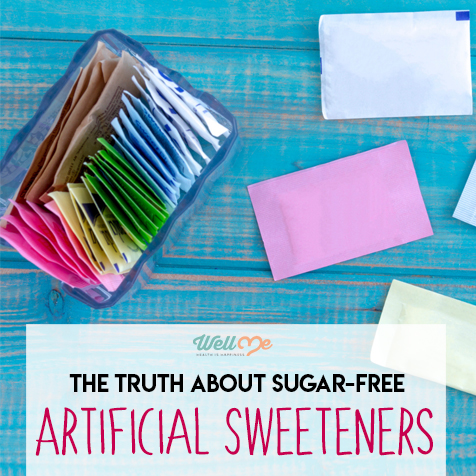You already know that too much sugar is bad for you. The problem with sugar is that it is a fast-absorbing carbohydrate that spikes blood sugar and blood-insulin levels. Sugar is an intrinsic part of the onset of diabetes, so it is no wonder that you and many other dieters are looking for ways to reduce your intake.
The problem begins when dieters are looking for the taste of sugar without the health problems associated with sugar itself. This is why sweeteners exist in the first place: if you were only bothered by the healthiness of a food, you’d never need sweeteners. In reality, food has a large cultural and psychological role in your day-to-day life, and the taste and sensation of eating is as much a part of why you do it as the role it plays in survival and nutrition.
There have been many controversies recently and the health and fitness world is always looking for something to make noise about. Artificial, zero-calorie sweeteners have received a great deal of this criticism simply because they are “too good to be true” with many influential sources suggesting a link between sweeteners (such as aspartame) and cancer. Despite the fact that excessive sugar intake (and the obesity it contributes to) is more likely to cause cancer than any form of sweetener, this controversy has brought a lot of attention to sweeteners and the respective industry.
Are sweeteners healthy? Do they cause cancer? Can they really be sweet and still contain zero calories? Today, we’re going to take you through the real cost of sugar-free sweeteners and dispel some of the myths and rumors surrounding them.
What are Artificial Sweeteners?
Artificial sweeteners are zero-calorie, sugar-free flavorings that add sweetness to a food or product, using a wide variety of chemical compounds to induce a sweet taste similar to sugar. These products even exist on a scale of sweetness, with many sweeteners existing between 60% and 90% of the sweetness of sugar. These products are designed to provide the same mouth-sensation as sugar without the same negative metabolic effects.
Many sweeteners contain non-digestible forms of sugar, or forms that are significantly lower-calorie than sugar itself (by volume). Many of these are sugar alcohols — a chemical alteration on traditional sugars that are less acidic and contain considerably fewer calories than sugar.
These have some effect on blood sugar, but considerably less than their sucrose (table sugar) alternatives. Obviously, consuming an excessive quantity of sugar-alcohol sweeteners is an easy way to cause metabolic damage, but the sheer quantity required is much greater than in traditional sugar or sugar-based products.
The Benefits of Artificial Sweeteners
The most obvious benefit of artificial sweeteners is that they aren’t sugar. Sugar has a variety of negative effects when consumed in excess: metabolic damage, contribution to obesity, and tooth decay. Sweeteners have no effect on some of these, and considerably less than sugar on others. For example, sweeteners tend not to contribute to tooth decay and have a significantly smaller glycemic load. Swapping high-sugar content foods for sweetened foods is a simple way to reduce the risk of developing diabetes, although it is important to remember that this is still a plausible risk.
Many sweeteners are also considerably lower-calorie than sugar, or simply zero-calorie. These forms of sweetener tend to be non-digestible, meaning that you can taste them but your body will not be able to digest them and burn them for fuel. This means that your body cannot utilize these compounds as a source of metabolic fuel, or that it does so with the result of less than 1 calorie.
This makes sweeteners a great choice for those looking to alter bad habits, reduce overeating, and control their overall calorie intake. The 50g of sugar found in many single-serving ice creams or fizzy drinks is equitable to 200 calories — replacing this with sweeteners is an easy way to significantly reduce calorie intake, or remove it completely.
The important thing to note is that sweeteners are primarily used, and should be used, in the production of junk foods. This means that they are reducing the overall health burden of already-unhealthy foods. There may be concerns over the effects of these sweeteners, but when they are used to replace a huge quantity of sugar, there are clear health benefits to their use.
Why Have Sweeteners Been Criticized?
Criticisms against sweeteners have been generally devised along two simple lines of argument: “sweeteners cause cancer” and “sweeteners are bad for digestive health.” These are the most common forms of argument that you’ll see on the internet, and they’re the two that have attracted the most scientific research.
1. Do Sweeteners Cause Cancer?
This argument has primarily been made against the sweetener aspartame. This chemical is one of the most popular forms of sugar-free sweetener and has primarily been used in the development of diet sodas.
Aspartame is a sugar alcohol that has been at the center of the debate around the health risks associated with artificial sweeteners and has received unfair attention. In the United States, you are likely to consume artificial sweeteners such as aspartame all the time — whether knowingly or not.
The health effects of aspartame and other artificial sweeteners have been greatly exaggerated — a recent meta-analysis of studies on artificial sweeteners has suggested that there is no significant risk associated with these chemical sweeteners[1]. The most common claim made against sweeteners is the potential to increase the rate of bladder cancer, but this has yet to be demonstrated in humans. Rat studies suggest an increased prevalence of cancer with certain compounds, but we’ve seen before how the positive and negative effects of certain compounds (such as Garcinia cambogia) do not translate from rodent studies to humans.
It is easy to see why these shocking results in rodent studies could lead to sensationalism in the media. The media is always looking for a story, and the risk of cancer in common sodas is a great one, but the scientific evidence does not back-up the claims that aspartame causes cancer.
This is similarly true of the wide variety of modern sweeteners on the market: the FDA has approved aspartame and others as “Generally Recognized as Safe” (GRAS). The FDA might have its flaws, but their approval of these compounds ensures that the balance of evidence points to their safety.
2. Do Artificial Sweeteners Cause Digestive Problems?
While there are no real concerns about artificial sweeteners and cancer, concerns persist regarding less-severe conditions such as digestive discomfort and diarrhea. These are more evidence-based, as many reviews by customers suggest that non-sugar sweeteners tend to result in poor bowel movements and general stomachache.
These are well-evinced concerns — for the past few decades, the science has borne out the legitimacy of stomach issues caused by the consumption of large quantities of sweeteners[2]. The real question, however, is related to the dose-response basis of these concerns. The scientific research suggests that there is a risk of sweetener-induced digestive problems, but that this is unlikely to occur at the kind of dose seen in a single can of diet soda. The real problem is excessive consumption, or consumption in products that are not expected to contain artificial sweeteners.
The development of more recent artificial sweeteners also poses an interesting challenge to this. Sweeteners that have been connected to digestive problems are considered to be “older”, and are currently being replaced by a newer generation of sweeteners. One such sweetener, designed specifically to combat the problems associated with excessive sweetener consumption, is erythritol.
Erythritol is a new-age sweetener designed to be more palatable, reduces digestive discomfort, and offers a much safer alternative to regular high-dose sweeteners[3]. Early research and reviews suggest a much higher threshold for comfortable consumption. There are still possibilities for digestive discomfort associated with these new-age sweeteners, but it is important to note that the overall consumption necessary for these side-effects is far beyond the recommended consumption of junk foods, which leads us to the most important part of using sweeteners.
3. Practical Problems: Do Sugar-Free Sweeteners Actually Help?
The most underrated criticism of sweeteners is that they provide a “band-aid” approach to developing a healthy diet, with an unsustainable approach to reducing high-sugar foods. Replacing sugary foods with foods that taste sugary may have some positive effects on your overall metabolic profile[4], but they provide a relatively poor approach to improving overall dietary intakes.
If you have serious dietary concerns about the digestive problems of consuming 5 cans of diet soda, the larger problem is your overall dietary quality. Nobody should be consuming these products in huge quantities like this — the point of diet sodas is not to totally replace a poor 5-cans-a-day diet, but to begin the process of reducing overall consumption. Diet sodas, and other sweetened products, are not a replacement for high-quality dietary fluids such as water (including fruit-infused) or green teas.
Sweeteners are, first and foremost, a way of providing damage control to junk foods. This was mentioned above but it remains important to note that these products should not make up a large part of your diet. While they may not be as damaging as conventional sodas and other junk foods, their dietary value is still minimal. The best way to characterize the health effects of sweeteners not as healthy, but as less-awful than high-sugar foods.
The Larger Problem: Food Culture vs Nutrition
The use and criticisms of artificial sweeteners are indicative of the larger problem that we have with food and nutrition. American food culture is one that prioritizes taste and mouth-feel over the health and fitness benefits of food. Improving your long-term health and fitness depends on undoing this approach to food. The best approach to improving your overall health for the long-term is to view food as a source of fuel and nutrients rather than as an excuse to indulge your baser desires.
Sweeteners can be a great way to bridge this process, reducing the negative health effects while you improve the quality of your diet. The mouth-sensation of a healthy food may not be as satisfying as fast food or low-quality store-bought foods, but a simple change towards increasing consumption of fresh produce and healthy whole foods.
Food education is a small part of our cultural and educational system — food is seen as a way to relax and binge, but this contributes to the 2/3 of Americans who struggle with weight management.
Breaking free of this psychological pattern of dependence is as simple as spending a month away from the types of foods and situations that focus on mouth-sensation rather than nutritional value. This takes a bit of self-awareness: are you the kind of individual who eats 3 well-balanced meals, but continues to snack on high-sugar foods? Do you struggle to structure a meal that contributes to your overall satiety and nutritional needs?
Developing a strategy specific to your needs requires you to know what those needs are, and where your weaknesses lie. Sweeteners are a great way to help with this, but they should be seen as a short-term crutch to a long-term break from these low-quality, unhealthy foods.
Overview: What IS the Real Cost of Sugar-Free Sweeteners?
When compared to the costs of a high-sugar diet, there are no real reasons to be concerned about the intake of sugar-free sweeteners. The health implications of consuming high-sugar soft drinks are considerably greater for cancer risks, obesity, metabolic derangement, and digestive environment damage than sweetener consumption.
This is an important piece of context that is often left out of the ‘sugar vs sweetener’ debate. Switching from a high-sugar diet to a diet that includes foods with artificial sweeteners will contribute to overall health, but is still inferior to cutting these foods out completely (even if this is more difficult).
Sweeteners and the criticisms of them are, however, indicative of a deeper health problem that is running rampant in the United States. Food has become a psychological dependence and the culture surrounding food focuses on the relaxing, stress-relieving properties rather than the objective health benefits associated with a healthy diet free from (or at least designed to mitigate) high-sugar food intake.
Minimally, we can say that sweeteners are better for you than sugars — they are less likely to contribute to the development of Type-2 diabetes, dental damage, and the calorie-density risks of sugars. Sweeteners should be considered the same way that multivitamins are: as a short-term crutch to aid in the transition towards a better overall diet, rich in nutrient-dense foods to replace them with.

Action Steps: Tips for Reducing Sugar Intake
- Replace all high-sugar drinks with sweetened drinks, or healthier alternatives.
- Spend a month without ANY of the trigger foods that you associate with binging or “comfort eating”.
- Foster an attitude that views food as a source of nutrients and fuel, rather than a way of making yourself happy.
- Begin replacing diet sodas with health-promoting drinks like green tea or water with effervescent or fruit infusion.
References
- [1] Weihrauch, M. R., and Diehl, V. “Artificial sweeteners—do they bear a carcinogenic risk?.” Annals of Oncology. 2014, 15.10: 1460-1465. <https://academic.oup.com/annonc/article/15/10/1460/170200>
- [2] Hodoniczky, Jason, Carol A. Morris, and Anne L. Rae. “Oral and intestinal digestion of oligosaccharides as potential sweeteners: A systematic evaluation.” Food chemistry 132.4 (2012): 1951-1958. <http://www.sciencedirect.com/science/article/pii/S0308814611017869>
- [3] Storey, D., et al. “Gastrointestinal tolerance of erythritol and xylitol ingested in a liquid.” European journal of clinical nutrition 61.3 (2007): 349-354. <https://www.nature.com/ejcn/journal/v61/n3/abs/1602532a.html>
- [4] Noda, K., K. Nakayama, and T. Oku. “Serum glucose and insulin levels and erythritol balance after oral administration of erythritol in healthy subjects.” European journal of clinical nutrition 48.4 (1994): 286-292. <http://europepmc.org/abstract/med/8039489>, AND
- Ishikawa, Masashi, et al. “Effects of oral administration of erythritol on patients with diabetes.” Regulatory Toxicology and Pharmacology 24.2 (1996): S303-S308. <http://www.sciencedirect.com/science/article/pii/S0273230096901129>








